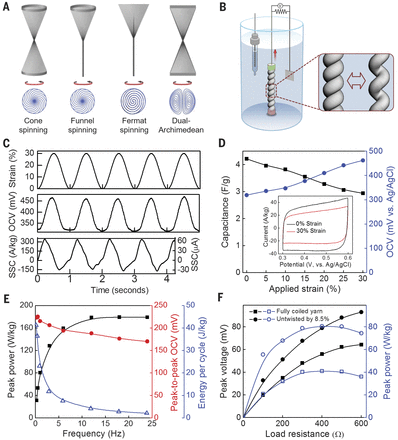 Shi Hyeong Kim,(1,2*) Carter S. Haines,(2*) Na Li,(2*) Keon Jung Kim,(1) Tae Jin Mun,(1) Changsoon Choi,(1) Jiangtao Di,(2) Young Jun Oh,(3) Juan Pablo Oviedo,(3) Julia Bykova,(4) Shaoli Fang,(2) Nan Jiang,(5) Zunfeng Liu,(5,6) Run Wang,(5,6) Prashant Kumar,(7) Rui Qiao,(7) Shashank Priya,(7) Kyeongjae Cho,(3) Moon Kim,(3) Matthew Steven Lucas,(8) Lawrence F. Drummy,(8) Benji Maruyama,(8) Dong Youn Lee,(1) Xavier Lepró,(2) Enlai Gao,(2) Dawood Albarq,(2) Raquel Ovalle-Robles,(4) Seon Jeong Kim,(1†) Ray H. Baughman(2†)
Shi Hyeong Kim,(1,2*) Carter S. Haines,(2*) Na Li,(2*) Keon Jung Kim,(1) Tae Jin Mun,(1) Changsoon Choi,(1) Jiangtao Di,(2) Young Jun Oh,(3) Juan Pablo Oviedo,(3) Julia Bykova,(4) Shaoli Fang,(2) Nan Jiang,(5) Zunfeng Liu,(5,6) Run Wang,(5,6) Prashant Kumar,(7) Rui Qiao,(7) Shashank Priya,(7) Kyeongjae Cho,(3) Moon Kim,(3) Matthew Steven Lucas,(8) Lawrence F. Drummy,(8) Benji Maruyama,(8) Dong Youn Lee,(1) Xavier Lepró,(2) Enlai Gao,(2) Dawood Albarq,(2) Raquel Ovalle-Robles,(4) Seon Jeong Kim,(1†) Ray H. Baughman(2†)
1)Center for Self-Powered Actuation, Department of Biomedical Engineering, Hanyang University, Seoul 04763, South Korea. 2)Alan G. MacDiarmid NanoTech Institute, University of Texas at Dallas, Richardson, TX 75080, USA. 3)Department of Materials Science and Engineering, University of Texas at Dallas, Richardson, TX 75080, USA. 4)Lintec of America, Nano-Science & Technology Center, Richardson, TX 75081, USA. 5)Jiangnan Graphene Research Institute, Changzhou 213149, China. 6)State Key Laboratory of Medicinal Chemical Biology, College of Pharmacy, Nankai University, Tianjin, 300071, China. 7)Department of Mechanical Engineering, Virginia Polytechnic Institute and State University, Blacksburg, VA 24061, USA. 8)Air Force Research Laboratory, Materials and Manufacturing Directorate, Wright-Patterson Air Force Base, Dayton, OH 45433, USA. *)These authors contributed equally to this work. †)Corresponding author.
*Corresponding author.E-mail: sjk@hanyang.ac.kr.
원문 링크 : https://science.sciencemag.org/content/357/6353/773
Abstract
Mechanical energy harvesters are needed for diverse applications, including self-powered wireless sensors, structural and human health monitoring systems, and the extraction of energy from ocean waves. We report carbon nanotube yarn harvesters that electrochemically convert tensile or torsional mechanical energy into electrical energy without requiring an external bias voltage. Stretching coiled yarns generated 250 watts per kilogram of peak electrical power when cycled up to 30 hertz, as well as up to 41.2 joules per kilogram of electrical energy per mechanical cycle, when normalized to harvester yarn weight. These energy harvesters were used in the ocean to harvest wave energy, combined with thermally driven artificial muscles to convert temperature fluctuations to electrical energy, sewn into textiles for use as self-powered respiration sensors, and used to power a light-emitting diode and to charge a storage capacitor.